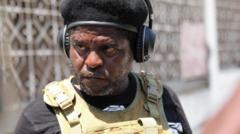**El Salvador's President Nayib Bukele has stated that Kilmar Ábrego García, mistakenly deported from the US, will not be returned, raising concerns over human rights and bilateral relations.**
**El Salvador's President Declines to Repatriate Wrongfully Deported Man**

**El Salvador's President Declines to Repatriate Wrongfully Deported Man**
**Dispute Over Deportation Shows Tensions Between US and El Salvador's Immigration Policies**
El Salvador's President Nayib Bukele has declared that Kilmar Ábrego García, who was deported from the United States in error, will not be returned to the US. This announcement was made during a recent meeting with former President Donald Trump at the White House, where the two leaders reaffirmed their strong partnership. The US Supreme Court had previously ruled that the Trump administration was obligated to "facilitate" the return of Mr. Ábrego García, who had been granted protection from deportation by a Maryland court in 2019. Nonetheless, the administration claims that the decision falls under El Salvador's jurisdiction.
President Trump expressed gratitude towards Bukele for his cooperation in accepting alleged gang members deported from the US, enhancing Trump's tough stance on immigration and crime. Mr. Ábrego García, who was among 238 Venezuelans and Salvadorans deported to a controversial mega-prison known as Cecot, has had his gang affiliations disputed by his lawyer. In their meeting, Trump also indicated that he wished to deport US citizens convicted of violent crimes to Salvadoran facilities.
Meanwhile, US Secretary of State Marco Rubio announced that an additional ten alleged gang members were deported to El Salvador amidst ongoing legal challenges regarding previous deportations. The allegations of gang involvement stem from the administration's classification of individuals as part of the MS-13 and Tren de Aragua gangs, organizations designated as "foreign terrorist organizations" during Trump's tenure.
Despite the legalities surrounding Mr. Ábrego García's case, his family continues to be enveloped in fear and uncertainty. His wife, Jennifer Vasquez Sura, criticized both administrations for using his life as a political pawn. With the El Salvadorian government receiving financial incentives for accepting deportees – about $20,000 per person – Bukele is effectively leveraging this situation for political gain, while simultaneously facing scrutiny from human rights groups regarding conditions in Cecot and the lack of due process.
The mega-prison, which has garnered global attention for its harsh conditions, can hold up to 40,000 inmates. Human rights abuses and overcrowded living conditions have sparked widespread criticism. As Bukele maintains a seemingly advantageous relationship with Trump, questions arise concerning the implications on democracy and human rights in El Salvador, especially as the US turns a blind eye, prioritizing its border security policies. The community and legal advocates continue to seek justice for those affected by these controversial deportation practices.


















